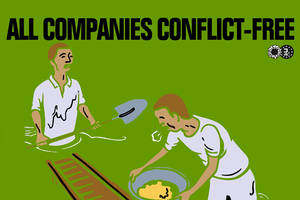
Download the infographics
On May 20th the European Parliament will vote on conflict minerals legislation. Greens fear that the proposal will be robbed of all its meaning as EU leaves decision to ban conflict minerals up to companies.
Last month, the New York Times published an article by Sakharov prize winner Denis Mukwege in which he calls on the European Union to adopt binding transparency rules on minerals imports into the EU. The trade of these so-called conflict minerals fuel conflict or violence overseas. He warns that proposed EU legislation currently under consideration undermines global attempts to clean up the deadly conflict minerals trade.
Mukwege knows as no other, how innocent civilians bear the brunt of violent unrest that is fuelled by the mineral trade. In his country, the Democratic Republic of Congo, armed groups profit from illegal mining and leave trails of fear and destruction. The minerals sold by these rebel groups end up in our products such as tablets, tin cans, smartphones, computers and light bulbs.
A European law would have the opportunity to break the link between trade in minerals and conflict by creating transparency in the supply chain, thus allowing consumers to ascertain whether their purchases indirectly fuel conflict and human rights abuses elsewhere in the world. The Greens were very disappointed, that five years after the United States introduced mandatory transparency rules for listed companies, the European Commission proposed a law that is void. The system put forward is voluntary and only targets 0.05% of EU companies that use these minerals. The European Parliament’s International Trade Committee pretends to go a step further by introducing binding transparency rules. This however solely applies to the smelters and refiners, of which only twenty operate in the EU- out of 450 globally. The scheme will be entirely voluntary for all other companies that import these minerals or products containing these minerals.
Business leaders, investors, religious leaders, civil society and consumers have expressed their wish for effective, binding rules that apply to all companies. As only with full supply chain involvement will it be possible to get transparency across the board. They demand binding rules as we know that companies will not abide by transparency rules voluntarily, as evidenced by the fact that in the 5 years following the adoption of similar OECD guidelines on the very same subject, a disappointing 12% of EU companies was found to be compliant, and this was mainly due to the American conflict mineral law. If a binding European scheme for all companies is enforced in parallel with the American law, this will contribute to the creation of a global level playing field without conflict minerals.
Greens will push for a proposal that is in line with the position of the Development Committee, which demands binding rules on conflict minerals for all companies in the supply chain. In the past, The European parliament has adopted resolutions that included such rules, designed to prevent companies from contributing to conflict and human rights abuses. We will fight to make sure that the EU legislation on conflict minerals is not robbed of all its meaning and turned into little more than an empty shell.

